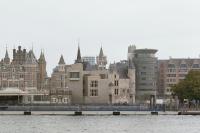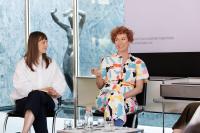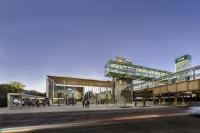Venue for the center of Mondercange
Mondercange, Luxembourg
Due to its location in the centre of the village, the open area between clubhouses had long been used for festive occasions. The lack of infrastructure meant that every event required considerable organisational effort. Over the past few years this had resulted in ever fewer festive events being staged, impoverishing the social life of the village.
To make this central space once again attractive to residents, and to avoid having to install services and structures such as electricity, water, marquees, stages, bars and toilets for every event, Bruck + Weckerle Architects suggested the provision of a multi-functional infrastructure.
The intervention of Bruck + Weckerle Architects was to decompose the complexity of the assignment in three components:
The surfaces The pavilions The roofs
The specially designed elements were arranged in such a way that the area provides a covered playground for children, school classes and families throughout the week but can at a moment’s notice be transformed into an entertainment venue at weekends.
Layout of surfaces
The initial step was to structure the area into three distinct zones marked off by walls, step seating and stairs so as to be clearly individualised. Trees on the site were incorporated into the overall design and pedestrian connections enhanced. Two of the zones are executed in concrete and roofed over while the third, with an existing tree at its centre, has gravel underfoot.
The pavilions
The infrastructure is housed in three pavilions whose shape and size differ only slightly. These wooden structures are covered with sturdy “Eternit” panels. By means of sliding shutters, every opening can be tightly sealed, converting the buildings into outdoor furniture unscathed by either flying balls or vandals. When open, their function is revealed. The pavilion nearest to the entry houses the cash desk and the kitchen. The pavilion diagonally opposite has the bar and toilets. Behind the stage stands the storage room pavilion, which also provides a changing room for performers. Each pavilion is assigned to a specific spatial zone or, alternatively, can be seen as spreading out a zone before it. This layout generates clear
spatial inter-relationships and gives the new village square a sense of place.
The roofs
The greatest challenge was to provide sufficient shelter to avoid needing to erect marquees and at the same time ensure adequate lighting for each zone and good acoustics for future concerts.
The roofscape of the village, that of old farmhouses and barns, is dominated by large saddle roofs. From a distance, the collective impression is of numerous folded surfaces. This theme was transposed to the roofing design for the public open spaces.
Bruck + Weckerle Architects developed a steel roof structure for the two concrete-surfaced areas. The starting point was a flat sheet which was then cut into strips like paper-cutting art, each strip being bent at a single point and laid so as to alternate the peaks of adjoining strips. This strategy has solved four problems at once:
- The varying, bent strips blend perfectly into the village roofline.
- Stability is ensured, even the roof beams being 28 metres long and only 20 cm in height.
- The triangular openings between the strips provide optimal lighting for the areas below.
- The uneven underside of the roof gives excellent acoustics.
- Architects
- Bruck + Weckerle Architekten
- Location
- Mondercange, Luxembourg
- Year
- 2010













